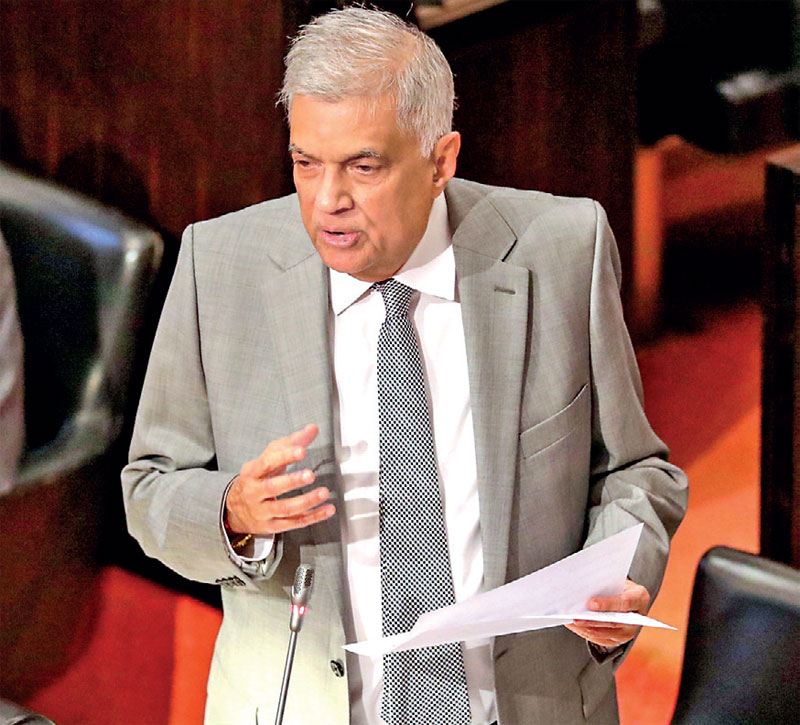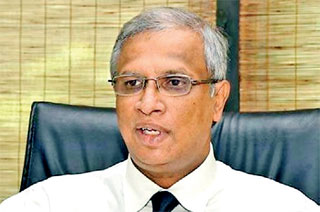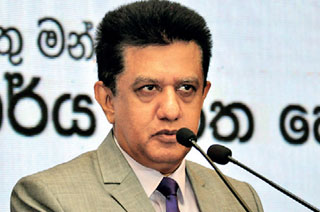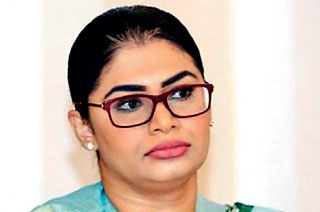Tuesday Feb 24, 2026
Tuesday Feb 24, 2026
Thursday, 17 November 2022 00:30 - - {{hitsCtrl.values.hits}}

President Ranil Wickremesinghe delivering the Budget speech

M.A. Sumanthiran

Prof. Charitha Herath addressing the FPC event on 13 November

Hirunika Premachandra
|
“You did well on economic liberalism sir, and I applaud you. All the reforms are good.”
– Dr. Harsha de Silva –
 In his Budget speech, President Ranil Wickremesinghe proudly proclaimed that the reforms he was proposing were not limited to those suggested by the IMF, which he added, were for the purpose of stabilising the economy. The rest were long overdue reforms to ensure a strong, high-growth economy, he said.
In his Budget speech, President Ranil Wickremesinghe proudly proclaimed that the reforms he was proposing were not limited to those suggested by the IMF, which he added, were for the purpose of stabilising the economy. The rest were long overdue reforms to ensure a strong, high-growth economy, he said.
Translated, this means that Ranil Wickremesinghe overloaded the ‘reform’ package with his own longstanding economic ideology which had failed to get him elected as President and limited his terms as elected Prime Minister to one each with a 15-year interval, culminating in being wiped out from the legislature together with his party at the last general election (2020). He has no mandate for what he is about to implement.
By loading his ideologically-driven reforms on top of the IMF’s necessary ones, he will doom the IMF’s reforms too. In a diatribe against ‘populism’ at a time when the zeitgeist contains strong streaks of populism, the world has witnessed the political victories of one or other variety of populism, and the international financial institutions as well as this year’s Davos summit have accommodated many social demands beneath those populist surges, President Wickremesinghe has revealed himself as stuck in a 1980s time warp, an adherent of ‘flat earth’ neoliberal market-fundamentalist dogma.
Economic extremism
Ranil’s Budget pronounces the 1977 Open Economy ‘broken’ and ‘over’ because those reforms went easy on state enterprise and “relief mentality, concessions”. The factual truth however, is that the 1977 Open Economy model helped trigger a southern civil war because it was generating far too much inequality and socioeconomic disequilibrium, as Prime Minister Ranasinghe Premadasa had consistently warned.
In his Budget speech President Wickremesinghe scrupulously avoids any reference whatsoever to the rectified, improved, successor model of the 1977 Open Economy, the Premadasa development model of growth with equity (1989-1993) and its breakthrough achievements (though he was in Cabinet at the time).
Sri Lanka’s crisis is partly sourced in the abandonment of that model after Premadasa’s assassination.
In a recent international seminar (via Zoom) at Griffith University, with Dr. Indrajit Coomaraswamy, Bhavani Fonseka and me, Emeritus Prof. Premachandra Atukorale urged that I encourage Sajith Premadasa to robustly champion his father’s economic model because “President Premadasa was ahead of his time and the latest thinking of the IMF has caught up with his model”.
Ranil is set to lease state lands to local corporates and multinational agribusiness, which would go completely against Premadasa’s Presidential Task Force (Sri Lanka’s first ever) on Land Redistribution (1990), which transferred the ownership of state lands to the landless and homeless for cultivation and construction of a dwelling.
Ranil’s policy automatically envisages scrapping the land reform ceiling of the Sirimavo Bandaranaike administration which neither presidents Jayewardene nor Premadasa ever did. Scrapping the land ceiling would make for vast landholdings and a class of large landowners which are a factor for class conflict in the countryside. The East Asian economic miracle from Japan to Korea and China to Vietnam was based on land reform programs which eliminated such landholdings and large landowning class.
President Wickremesinghe envisages the unilateral ‘restructuring’ of state enterprises and labour laws without the ILO recommended model of consultations and compromise with trade unions; a model which is perfectly congruent with President Premadasa’s 3Cs formula ‘consultation-compromise-consensus’ and his alternative to privatisation, namely ‘people-ization’.
Ranil Wickremesinghe’s Budget intends to tear up the Sri Lankan Social Contract between the citizens and the State, in which “relief/concessions” (as he scornfully puts it), the role of the state in the economy and the ceiling on land holdings were clauses. These may need to be renegotiated with society but Ranil is ripping them up, and without the popular mandate to do so that Maggie Thatcher and Ronald Reagan had. Wickremesinghe’s Budget has placed a ticking time-bomb under the foundations of Sri Lankan society and stability itself.
Not a “Good UNP Budget”
President Ranil Wickremesinghe disclosed in Parliament a compliment paid to him by the SJB’s Dr. Harsha de Silva after he presented Budget 2023, namely that it is “a good UNP budget”. To the contrary, it isn’t a good UNP budget, or any kind of UNP budget, or any kind of good budget.
Ranil’s economic model has never been seen before in Sri Lanka and dispenses with everything built up and every safeguard built-in since 1947. It is precisely the sort of budget that was never presented or permitted by any elected UNP head of government, Senanayake, Jayewardene or Premadasa, all of whom were realists/pragmatists and centrists of one sort or another.
Ranil’s is the kind of Budget that would have been presented by the far-right economic liberal fringe, chiefly B.R. Shenoy and Esmond Wickremesinghe (Ranil’s father), had any UNP leadership permitted it. The 2023 Budget contains a policy perspective which featured in a huge struggle within the UNP administration of 1965-1970 when Esmond and Shenoy presented it and were beaten back by the most renowned Ceylonese development thinkers, Dr. Gamani Corea (later Sec-Gen of UNCTAD) and Godfrey Gunatilleke (founder of MARGA), the state’s top economic policymakers of the day.
The extremist Shenoy-Esmond-JR line of the late 1960s was dumped by JR in 1977 as signalled by his choice of Finance Minister, the brilliant leftwinger and SLFP rebel Ronnie de Mel.
In stark contradistinction to Ranil’s reading of things, Ronnie de Mel, the architect of the 1977 Open Economy, speaking on his 91st birthday, advised Sajith Premadasa (as seen on TV news) that “the only hope for Sri Lanka’s economy was to get the whole thing under your [Sajith’s] policies”, and revive the Open Economy by infusing it with “more socialistic policies…in accordance with the country’s Buddhistic social ethos”.
Ranasinghe Premadasa’s stunningly successful economic model brought together in a triadic synthesis, the Open Economy of 1977, the developmentalist potential of the executive Presidency of 1978 and Godfrey Gunatilleke’s UN/Global South ‘Human Development’ thinking.
Curiously, over a year ago, Dr. Harsha de Silva tweeted that B.R. Shenoy’s thinking was “needed today”.
Freedom People’s Congress initiative
The ruling SLPP thinks that repeated incantation about COVID-19, global economic travails and impending help from the IMF will secure sympathy and a reprieve from the voters. It won’t. Repeated invocation of the 1973 OPEC oil price shock and Dr. N.M. Perera’s annual pilgrimage to the IMF and World Bank since 1970 did not dilute the damning indictment by the electorate in 1977 of Sirimavo Bandaranaike’s Government for the crime of economic torment of the masses, unshared sacrifice, and luxurious overconsumption by the elite.
If the Rajapaksa family thought that there’s no political existence, still less future for SLPP members outside of the family’s orbit and the government benches, the reformist rebel MPs grouped in the Nidahasa Janatha Sabhawa (FPC – Freedom People’s Congress) proved that assumption very wrong on Sunday 13 November. They launched two substantive framework documents for public discussion on political and economic reforms at a crowded event at the BMICH.
Though it was a risk to hold such an event on a slow Sunday morning, the Jasmine Hall was packed. The entirety of the mainstream progressive-centrist and centre-left political leadership was present, from Opposition leader Sajith Premadasa and former speaker Karu Jayasuriya, through M.A. Sumanthiran, Dayasiri Jayasekara, D.E.W. Gunasekara, Champika Ranawaka and Kumar Welgama to Udaya Gammanpila and Rishad Bathiudeen.
The FPC seniors, Prof. G.L. Peiris, Dullas Alahapperuma and Dilan Perera sat in the audience, giving full play to the younger MPs. It worked, with two tight, fast-paced, intellectually self-confident presentations on the crisis and necessary reforms by Prof. Charitha Herath and Dr. Nalaka Godahewa.
Charitha Herath’s subsequent contribution to the Budget debate was far more lucid and coherent than Dr. Harsha de Silva’s.
Apart from Kabir Hashim and Harsha de Silva, every politician necessary to form a government and propel Sri Lanka out of this deep crisis i.e., the core of an undeclared alternative government and shadow Cabinet, was in the Jasmine Hall on Sunday morning.
|
Trapping Tamil politicians
President Ranil Wickremesinghe has invited all Tamil MPs for discussions on resolving the problems of the Tamil people before the 75th Independence Day which falls on 4 February 2023. He has flagged his development plans for the North and East, especially Trincomalee.
The Tamil MPs have assented, with the more prominent TNA MPs understandably signalling that they would prioritise the political and Constitutional goals.
Ranil Wickremesinghe is a stand-in President, continuing what’s left of the term of his elected predecessor who was ousted by a momentous civic uprising. Furthermore, he is not elected to the President or the Parliament, nor yet is the party he leads. He has no mandate to negotiate anything with the Tamil parties and certainly no mandate to deliver on anything, however laudable.
M.A. Sumanthiran has reminded the President of his 2016 Constitutional draft and suggested that he carry it forward. This suggestion omits the glaring fact that whatever mandate Wickremesinghe had for that particular project evaporated in 2020 when he and his party utterly failed to be elected to Parliament, and therefore any resumption of that venture would be completely illegitimate.
Dazzling development plans for the North and East are not likely to go down well in the suffering South at this time of economic shrinkage and mass privation. Even in Italy, the notion of regional unevenness in development has long served as fuel for ultranationalist populism, even fascism.
Parliamentarians M.A. Sumanthiran and Eran Wickremaratne have been the most consistent and strident advocates of a Referendum on a new constitution which combines the abolition of the executive presidency and greater powers for the provinces. This is a dangerously irresponsible notion. It took only two maverick politicians, Boris Johnson and Nigel Farrage, and one large bus to persuade the majority of the British people to vote for Brexit.
A new Constitution along the lines that Suma and Eran advocate and is the possible product of a dialogue between President Wickremesinghe and the Tamil MPs, is bound to be trashed at a referendum. At a time that people are hurting badly, they will vote for anything that emanates from the government – which in today’s Sri Lanka as in Chile in 1990 would be an excellent thing, except that the text of the draft constitution will not be the only thing that goes in the shredder.
When ethnonational/ethno-regional issues are the ones at stake unlike in Chile, the backlash is going to have a toxic sting. With the Aragalaya being the replay of Hartal 1953, and Ranil Wickremesinghe playing Sir John Kotelawala the Second, his non-unitary draft Constitution of 2015-2019 would ensure a replay of Sinhala Only 1956.
Tamil politicians would do well to revisit the alternative political perspective of two generations of Tamil leftists from N. Sanmugathasan, veteran communist and founder of the island’s Maoist movement, to K. Pathmanabha, founder-leader of the EPRLF.
1. They warned against the practice of Tamil nationalism to regard the rightwing, reactionary, pro-West UNP as its main partner in Southern politics.
2. They argued that this alienated the progressive movement of the South which should be the natural allies of the Tamil cause.
3. They pointed out that the preferential option of the UNP as partner, an ideological and class option on the part of the Tamil political elite, contributed to the strength of Sinhala chauvinism because it folded into the backlash against the UNP led comprador capitalist elite.
4. They advocated an alliance between the progressives of the North and South as the main axis of a transformational politics.
5. They prophesied that the bourgeois Tamil nationalist project (including the LTTE project) would end in failure.
Tamil politics has been governed by a priori principles rather than a shrewd sense of time and place. Mainstream Tamil nationalism has tended to go with the Southern leader or party which offered them the most, rather than the ones who could actually deliver the most, which may have been significantly more modest than the empty promises of the higher bidder. No agreement between President Wickremesinghe and the Tamil politicians can stick in a context of economic contraction, austerity and polarising economic policies.
Tamil politicians should attend the meeting with Ranil and insist on the immediate halt/reversal of the planned/ongoing cartographic carve-up of the East and the immediate holding of Provincial Council elections.
AKD’s aggressive angularity
“When we observe the developments in society today, what is repeatedly reiterated and proved to society is the factor of how correct that noble task was then in the 1988-1989 era.” (YouTube) Thus declared Anura Kumara Dissanayake, leader of the JVP and founder-leader of the JJB, in a 54-minute address just this week at the open-air stadium of Vihara Maha Devi Park on 13 November 2022 marking the 33rd commemoration, of Rohana Wijeweera and the martyrs of the JVP’s second armed uprising.
This is the leader of a party which explicitly aspires to lead the country at the next election. Yet, he chooses not merely to mourn the dead and celebrate their valour, but to justify the Khmer Rouge or Sendero Luminoso type barbaric violence of the JVP’s uprising, specifying its worst period, the years 1988-1989, not just the martyrdom of 13 November 1989. The year 1988 began with the “noble task” of the JVP murdering Vijaya Kumaratunga by shooting him in the chest—and on party instructions—the face.
Far from cutting away from the worst of its past or reviewing it in a balanced, self-critical way, or seeing it as a tragedy, Anura Kumara Dissanayake upholds 1988-1989 as not merely historical but also relevant to today’s situation.
He justifies 1988-’89 by reference to the present, claiming that the present validates that horrendous past.
He says the present struggle is on a continuum with 1988-’89 and announces the intention to take that earlier struggle to successful completion.
Harassing Heroic Hirunika
Ranil Wickremesinghe and Minister Tiran Alles have followed-up their cruel injustice of detaining Wasantha Mudalige and Ven. Siridhamma under the PTA by the egregious blunder of either ordering or permitting the Police to arrest and charge Hirunika Premachandra.
Hirunika is a personality of the main democratic Opposition and National Organiser of its Women’s wing, the Samagi Vanitha Balavegaya (SVB). She is a heroine of the Aragalaya generation. A courageous young woman politician with an assassinated father, she obtained justice for him by petitioning the Supreme Court successfully against the release of his convicted killer.
Her personality, flair, and in-your-face style of frenetic activism strongly remind me of Chandrika Bandaranaike Kumaratunga in her best decade, 1984-1994. My ‘next decade’ shortlist of 5 consists of Hirunika Premachandra, Charitha Herath, Harsha de Silva, Harini Amarasuriya—and (as black swan/dark horse) Duminda Nagamuwa. Hirunika will make it to the top or somewhere very close to it in a decade or so. Those who persecute her had better watch out—she’ll take the fight to them unremittingly, including in the highest court.